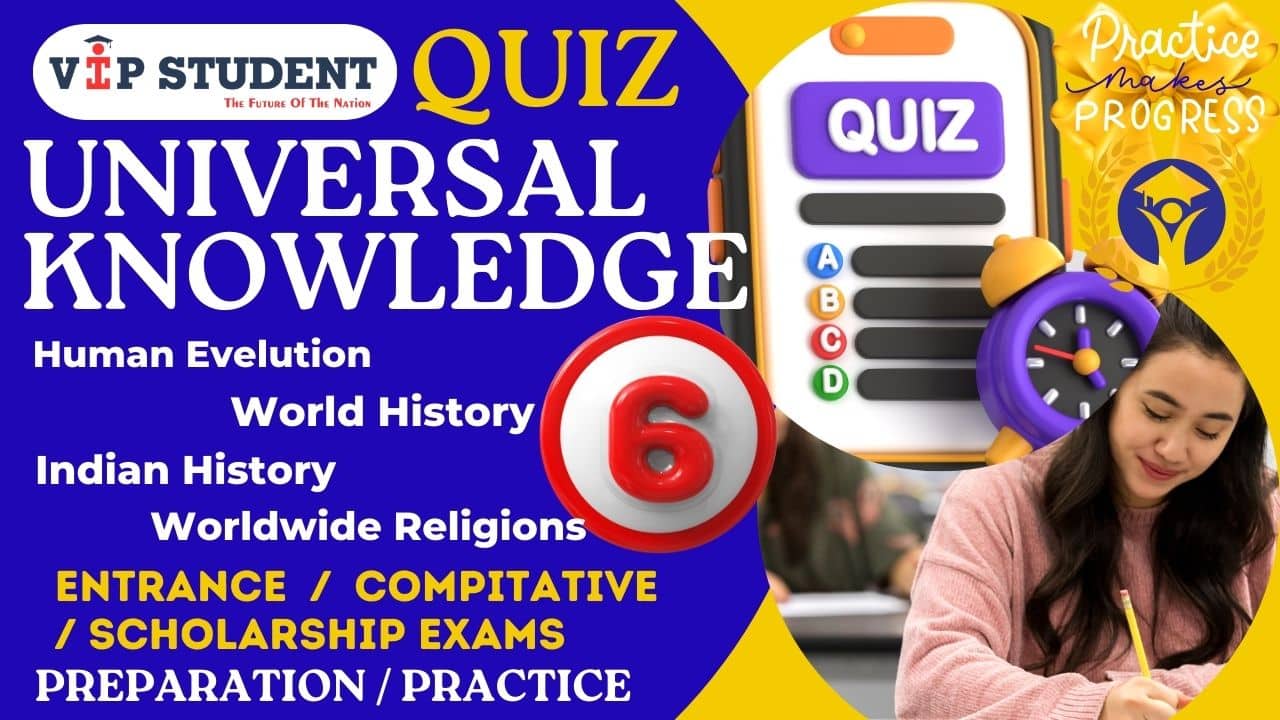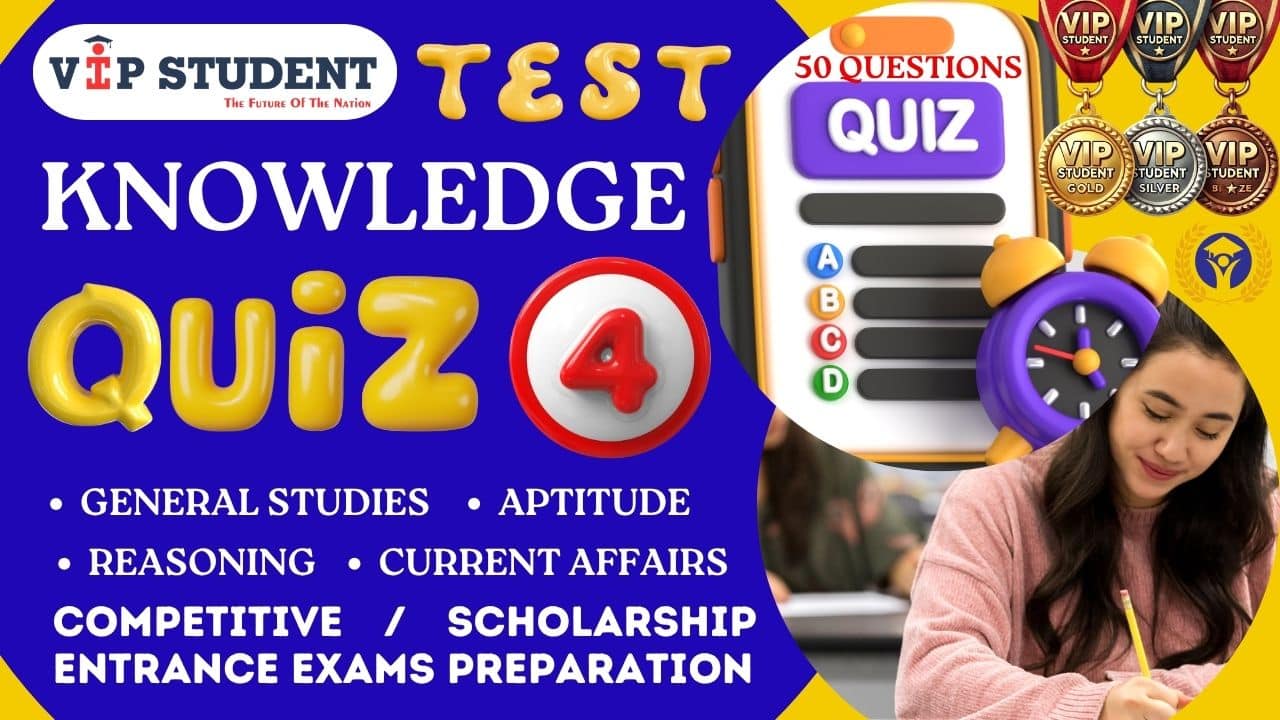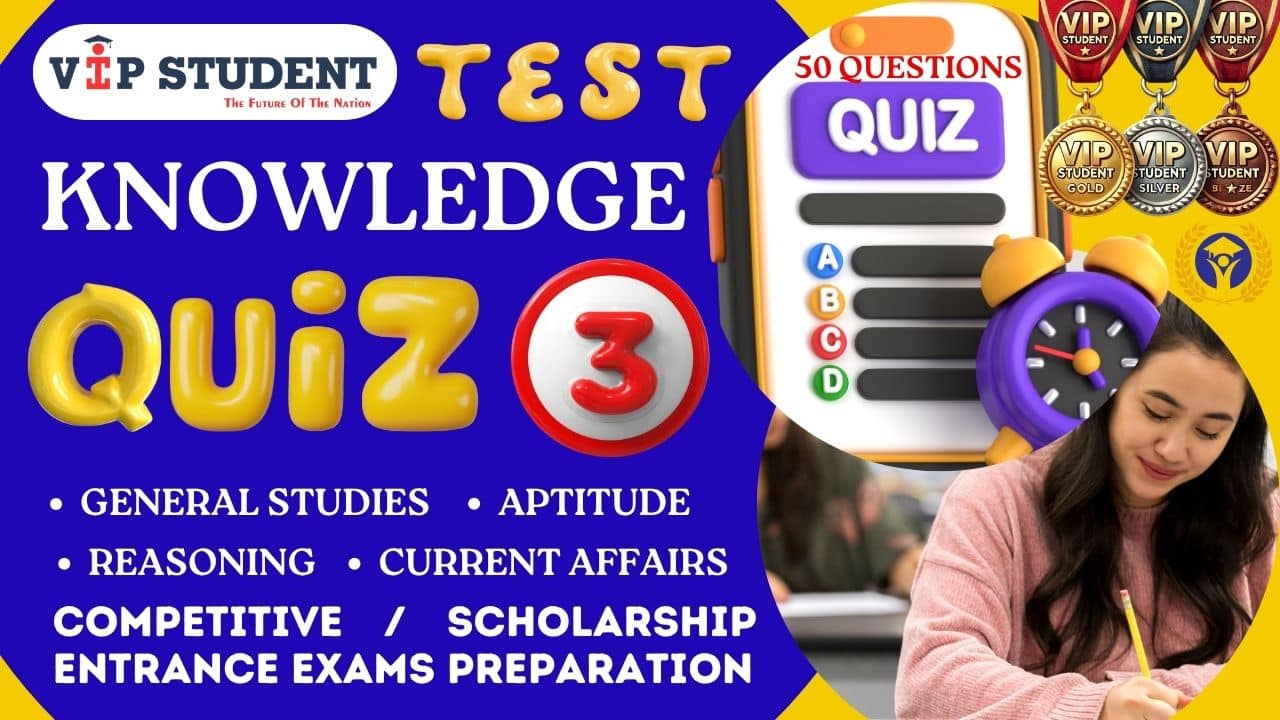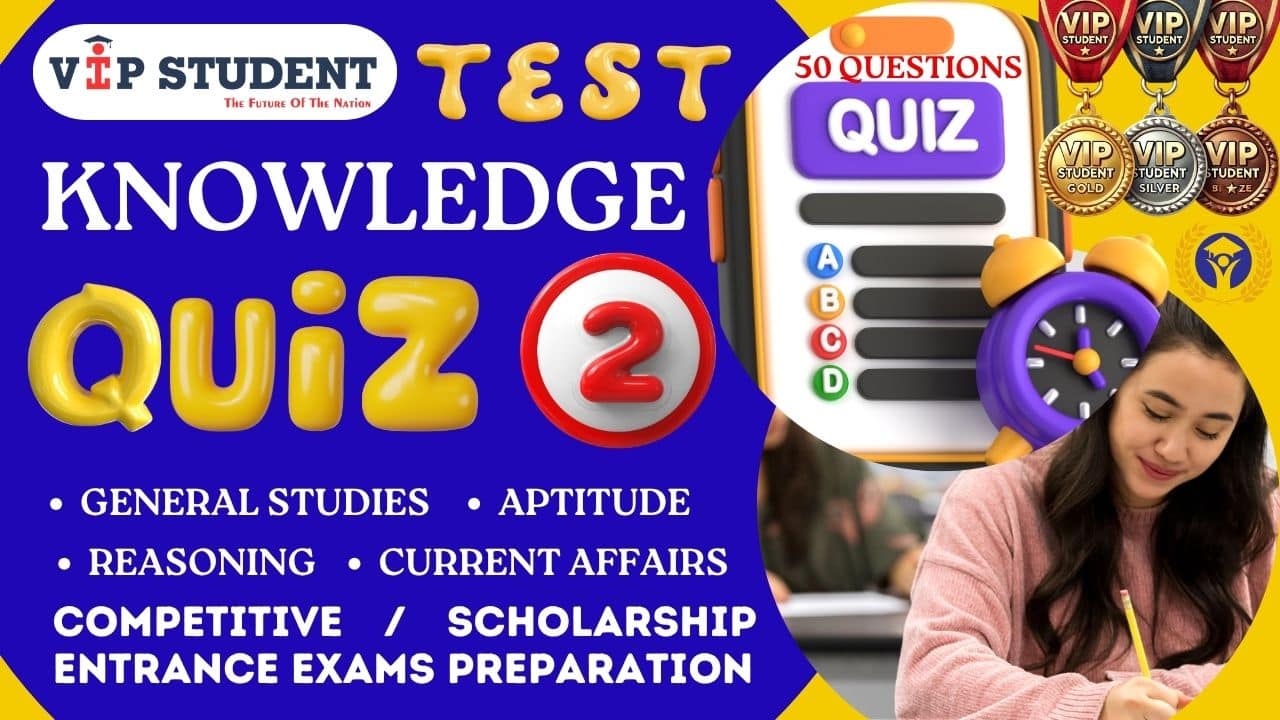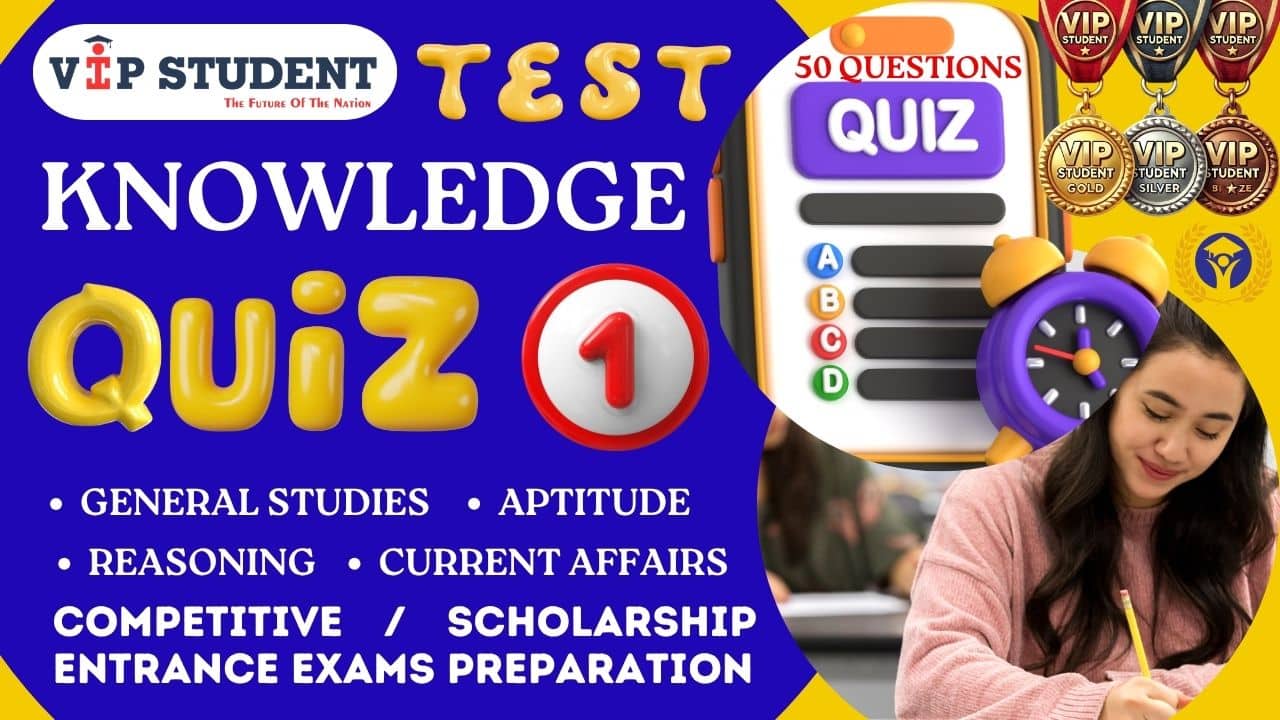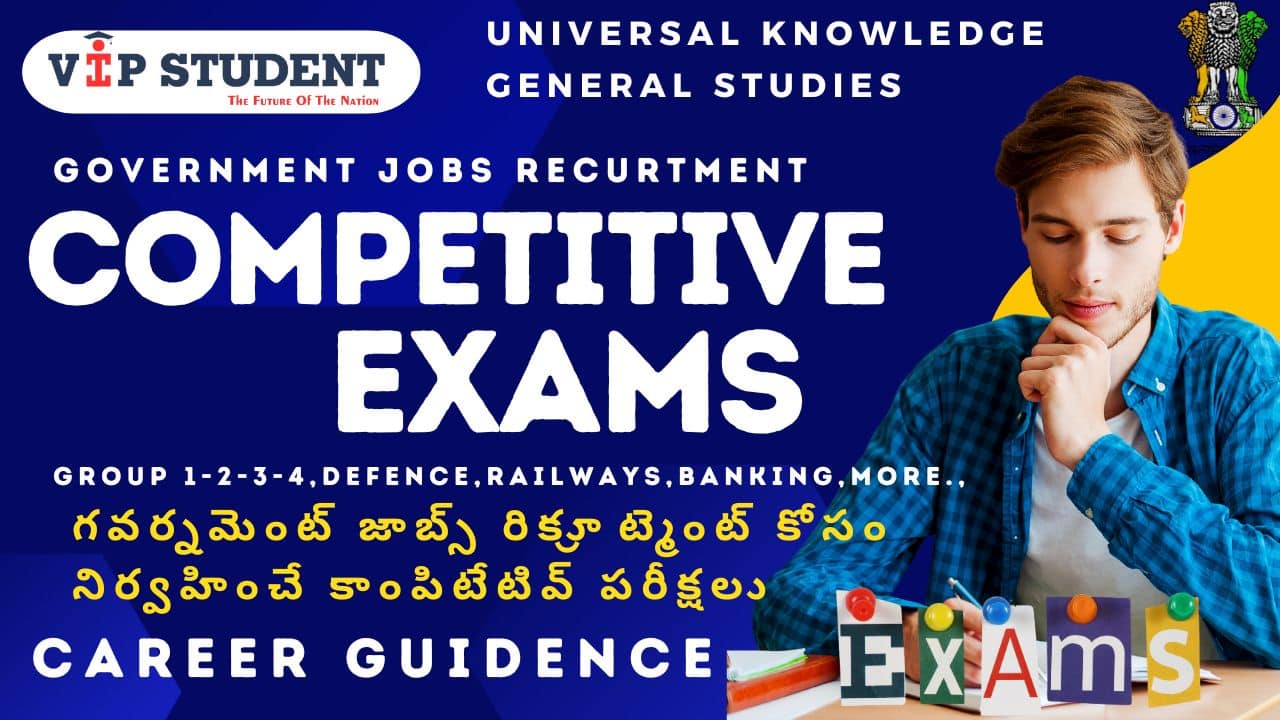Universal Knowledge Quiz 6: మానవ పరిణామక్రమం (Human Evolution), ప్రపంచ చరిత్ర (world history), భారత దేశ చరిత్ర (Indian History), ప్రపంచ వ్యాప్త మతాలు (world wide Religions) నాలెడ్జ్ నందు ఎంట్రన్స్/ కాంపిటీటివ్/ స్కాలర్షిప్ పరీక్షల ప్రాక్టీసు ప్రశ్నలు, యూనివర్సల్ నాలెడ్జ్ క్విజ్ 6.
UNIVERSAL KNOWLEDGE TEST QUIZ 6: విద్యార్థులు అకాడమిక్స్ (Acadamics )తో పాటు అర్థమ్యాటిక్స్ (Arithmetic), రీజనింగ్ (Reasoning), ఆప్టిట్యూడ్ (Aptitude), ఇంగ్లీష్ కాంప్రహెన్షన్ ( English Comprehension), జనరల్ స్టడీస్ (General Studies), హిస్టరీ (History), ప్రొఫెషనల్ (Professional), బిజినెస్ (Business), ఎంప్లాయిమెంట్ (Employment), ఎకనామిక్స్ (Economics), అగ్రికల్చర్ (Agriculture), ఇండస్ట్రీస్ (Industries), మరియు రాష్ట్ర, జాతీయ, అంతర్జాతీయ సమకాలీన అంశాలు ( International, National, State Current Affairs) నందు మీ నాలెడ్జ్ నీ మెరుగుపరుచుకోవడానికి ప్రతీ నెల నిర్వహించే యూనివర్సల్ నాలెడ్జ్ టెస్టు క్విజ్ 6 నందు పాల్గొని మీ యూనివర్సల్ నాలెడ్జ్ సామర్ధ్యాన్ని పరీక్షించుకొనగలరు.
విద్యార్థులు ఈ యూనివర్సల్ నాలెడ్జ్ టెస్టు క్విజ్ ల నందు పాల్గొనటం ద్వారా ఎంట్రన్స్ మరియు కాంపిటీటివ్ పరీక్షలు రాసే నైపుణ్యాన్ని, టైమ్ మేనేజ్మెంట్ స్కిల్స్ ను మెరుగు పరుచుకోవటం తో పాటు జిల్లా, రాష్ట్రము, జాతీయ, అంతర్జాతీయ స్థాయిలో నిర్వహించే ఎడ్యుకేషనల్ ఎంట్రన్స్ మరియు కాంపిటీటివ్ పరీక్షలు నందు, గవర్నమెంట్/ప్రైవేట్ జాబ్స్ ఎంట్రన్స్ మరియు కాంపిటీటివ్ పరీక్షలు నందు, మరియు హయ్యర్ ఎడ్యుకేషన్ స్కాలర్షిప్ ఎంట్రన్స్ మరియు కాంపిటీటివ్ పరీక్షలు నందు పాల్గొనడానికి మిమ్మల్ని మీరు సంసిద్ధం చేసుకొన గలరు.
CAREER GOALS / భవిష్యత్తు లక్ష్యాలు: భవిష్యత్తు లో ఉన్నత విద్య కోసం ఎంట్రన్స్ పరీక్షలు వ్రాయటానికి, ఐ. ఏ.యఎస్ (కలెక్టరు), ఐ.పి.యస్, ఎం.ఆర్.ఓ, జడ్జి, గ్రూప్ 1,2,3,4 ఉద్యోగాలు, రెవెన్యూ శాఖ, రైల్వే శాఖ, పోస్టల్ శాఖ, పోలీసు శాఖ,న్యాయ శాఖ, బ్యాంకింగ్, ఇండియన్ ఆర్మీ, నేవీ, ఎయిర్ ఫోర్స్ వంటి గవర్నమెంట్ శాఖల నందూ ఉద్యోగ కల్పన చేయటానికి యూనియన్ పబ్లిక్ సర్వీసు కమిషన్ (UPSC), స్టాఫ్ సెలెక్షన్ కమిషన్ (SSC), స్టేట్ పబ్లిక్ సర్వీస్ కమిషన్ (PSC) నిర్వహించే కాంపిటీటివ్ పరీక్షలు వ్రాయటానికి , ప్రైవేటు రంగంలో ఉద్యోగాలు సాధించటానికి మరియు ఉన్నత విద్యా స్కాలర్షిప్ పరీక్షలు వ్రాయటానికి కావలసిన నాలెడ్జ్ ను పెంపొందించుకొనగలరు.
UNIVERSAL KNOWLEDGE TEST QUIZ BENIFITS / నాలెడ్జ్ టెస్టు ప్రయోజనాలు : ఈ యూనివర్సల్ నాలెడ్జ్ టెస్టు క్విజ్ ల నందు పాల్గొని 1000 మార్కులు సాధించిన విద్యార్థులు బ్రాంజ్ సర్టిఫికేషన్ అవార్డు, 2000 మార్కులు సాధించిన విద్యార్థులు సిల్వర్ సర్టిఫికేషన్ అవార్డు మరియు 3000 మార్కులు సాధించిన విద్యార్థులు గోల్డ్ సర్టిఫికేషన్ అవార్డు పొందగలరు. ఈ యూనివర్సల్ నాలెడ్జ్ సర్టిఫికేషన్ అవార్డులు మీ భవిష్యత్తు లక్ష్యాల నందు విజయం సాధించడానికి మరియు మీ ప్రతిభకు విలువైన గుర్తింపును అందిస్తాయి.
Eligibility/ అర్హత : భారత పౌరులై ఉండి 6వ తరగతి, 7వ తరగతి, 8వ తరగతి, 9 వ తరగతి, 10 వ తరగతి , 11వ,12వ తరగతులు (ఇంటర్మీడియట్), అండర్ గ్రాడ్యుయేషన్ మరియు గ్రాడ్యుయేషన్ చదువుతున్న విద్యార్థులు మరియు ఎంట్రన్స్/ కాంపిటీటివ్ పరీక్షలు కి ప్రిపేర్ అవుతున్న విద్యార్థులు నాలెడ్జ్ టెస్టు క్విజ్ ల నందు పాల్గొనుటకు అర్హత కలిగి ఉంటారు.
UNIVERSAL KNOWLEDGE TEST QUIZ 6 – యూనివర్సల్ నాలెడ్జ్ టెస్టు క్విజ్ 6
[REGISTER NOW / రిజిస్టర్ అవ్వండి] |
QUIZ DETAILS AND INSTRUCTIONS – క్విజ్ వివరాలు మరియు సూచనలు :
Number of Quiz Questions – క్విజ్ ప్రశ్నల సంఖ్య: 100.
Quiz Time – క్విజ్ సమయము: 60 minits/ 60 నిమషాలు.,
Quiz Attempts – క్విజ్ ప్రయత్నాలు : Only One Attempt / ఒక్క ప్రయత్నము మాత్రమే
Register or Log In/ రిజిస్టర్ లేదా లాగ్ ఇన్: If you haven’t already, you may need to create an account and log in with your registered mail id and created password to access the quiz before participating the quiz.
ముందుగా రిజిస్టర్ అవ్వండి, క్విజ్ లో పాల్గొనే ముందు మీరు రిజిస్టర్ అయిన మెయిల్ ఐడి మరియు మీరు పెట్టుకున్న పాస్వర్డ్ తో లాగ్ ఇన్ అవ్వండి.
Start the Quiz/ క్విజ్ ను ప్రారంభించండి: Follow the on-screen instructions to begin the quiz. Ensure you have a stable internet connection and a quiet environment to concentrate.
ఆన్ స్క్రీన్పై ఉన్న సూచనలను అనుసరించి క్విజ్ ప్రారంభించండి. మీకు స్థిరమైన ఇంటర్నెట్ కనెక్షన్ మరియు శాంతమైన వాతావరణం ఉండేలా చూసుకోండి, ఏకాగ్రతకు సహాయపడుతుంది.
Submit Your Answers/ మీ సమాధానాలను సమర్పించండి : After completing the quiz, submit your answers to receive your score and feedback.
క్విజ్ పూర్తయ్యిన తర్వాత, మీరు పొందిన స్కోర్ మరియు ఫీడ్బ్యాక్ను తెలుసుకునేందుకు మీ సమాధానాలను సమర్పించండి.
Note/గమనిక: “You have only one chance to participate in this Universal Knowledge Quiz, so before participating in the Universal Knowledge Test Quiz , Practice the quiz questions given below this quiz. మీరు ఈ నాలెడ్జ్ టెస్టు క్విజ్ నందు పాల్గొనటానికి ఒక్క అవకాశమే ఉంది, కాబట్టి నాలెడ్జ్ టెస్టు క్విజ్ లో పాల్గొనే ముందు ఈ క్విజ్ కింద ఇచ్చిన క్విజ్ ప్రశ్నలను ప్రాక్టీస్ చేయండి.
UNIVERSAL KNOWLEDGE QUIZ 6: 100 Questions యూనివర్సల్ నాలెడ్జ్ క్విజ్ – 6: 100 ప్రశ్నలు
UNIVERSAL KNOWLEDGE QUIZ 6: Practice Quiz questions in Human Evolution Knowledge – మానవ పరిణామ క్రమం నాలెడ్జ్ క్విజ్ నందు ప్రాక్టీస్ ప్రశ్నలు
1. Who is considered the father of the theory of evolution?పరివర్తన సిద్ధాంతానికి తండ్రిగా ఎవరు పరిగణించబడతారు?✅ (KT QUIZ JUNE 2025 QUESTION)
a) Charles Darwin (చార్లెస్ డార్విన్)
b) Albert Einstein (ఆల్బర్ట్ ఐన్స్టీన్)
c) Isaac Newton (ఐజాక్ న్యూటన్)
d) Gregor Mendel (గ్రెగర్ మెండెల్)
2. What is the name of Darwin’s famous book on evolution? పరివర్తనంపై డార్విన్ ప్రఖ్యాత గ్రంథం పేరు ఏమిటి?
a) Origin of Species (ఆరిజిన్ ఆఫ్ స్పీషీస్)
b) Natural Selection (నేచురల్ సెలెక్షన్)
c) Survival of the Fittest (సర్వైవల్ ఆఫ్ ది ఫిటెస్ట్)
d) Evolution and Genetics (పరివర్తన మరియు జన్యుశాస్త్రం)
3. What is the process of change in species over time called? ప్రజాతుల్లో సమయానుగుణంగా మార్పు చెందే ప్రక్రియను ఏమని పిలుస్తారు?
a) Mutation (మ్యూటేషన్)
b) Evolution (పరివర్తన)
c) Adaptation (అనుకూలత)
d) Extinction (నశింపు)
4. What is the name of the earliest known human ancestor? అత్యంత ప్రాచీన మానవ పూర్వీకుడి పేరు ఏమిటి?
a) Homo sapiens (హోమో సేపియన్స్)
b) Australopithecus (ఆస్ట్రలోపిథెకస్)
c) Neanderthal (నియాండర్తాల్)
d) Cro-Magnon (క్రో-మాగ్నన్)
5. Where did modern humans first appear? ఆధునిక మనుషులు తొలిసారి ఎక్కడ కనిపించారు?
a) Asia (ఆసియా)
b) Africa (ఆఫ్రికా)
c) Europe (యూరప్)
d) America (అమెరికా)
6. What is the meaning of “Homo sapiens”? “హోమో సేపియన్స్” అంటే ఏమిటి?
a) Wise man (తెలివైన వ్యక్తి)
b) Strong man (శక్తివంతమైన వ్యక్తి)
c) Walking man (నడిచే వ్యక్తి)
d) Hunter man (వేటగాడు)
7. Which human ancestor was the first to use tools? మొదటగా సాధనాలను ఉపయోగించిన మానవ పూర్వీకుడు ఎవరు?
a) Homo habilis (హోమో హాబిలిస్)
b) Homo erectus (హోమో ఎరెక్టస్)
c) Australopithecus (ఆస్ట్రలోపిథెకస్)
d) Neanderthal (నియాండర్తాల్)
8. What was the first material used by early humans to make tools? మొదటి మానవులు సాధనాలను తయారు చేయడానికి ఉపయోగించిన పదార్థం ఏమిటి?
a) Stone (రాయి)
b) Metal (లోహం)
c) Wood (మర్రి)
d) Bone (ఎముక)
9. Which species of human was known for its large brain size? పెద్ద మెదడుతో ప్రసిద్ధి చెందిన మానవ జాతి ఏది?
a) Homo sapiens (హోమో సేపియన్స్)
b) Homo erectus (హోమో ఎరెక్టస్)
c) Neanderthal (నియాండర్తాల్)
d) Homo habilis (హోమో హాబిలిస్)
10. Which of the following is an example of human adaptation? ఇవాటిలో ఏది మానవ అనుకూలతకు ఉదాహరణ?
a) Walking upright (నిటారుగా నడవడం)
b) Using fire (అగ్నిని ఉపయోగించడం)
c) Making tools (సాధనాలను తయారు చేయడం)
d) All of the above (పైవన్నీ)
11. What is the process by which organisms better suited to their environment survive? పర్యావరణానికి బాగా సరిపోయిన జీవులు బతికే ప్రక్రియను ఏమని పిలుస్తారు?
a) Evolution (పరివర్తన)
b) Natural selection (నేచురల్ సెలెక్షన్)
c) Mutation (మ్యూటేషన్)
d) Extinction (నశింపు)
12. What was the primary diet of early humans? మొదటి మానవుల ప్రధాన ఆహారం ఏమిటి?
a) Meat and plants (మాంసం మరియు మొక్కలు)
b) Fruits only (పళ్ళు మాత్రమే)
c) Grains only (ధాన్యాలు మాత్రమే)
d) Milk and honey (పాలు మరియు తేనె)
13. Which discovery helped early humans cook food? ఆహారాన్ని వండడానికి సహాయపడిన ఆవిష్కరణ ఏది?
a) Fire (అగ్ని)
b) Tools (సాధనాలు)
c) Shelter (నివాసం)
d) Language (భాష)
14. Which species is closest to modern humans? ఆధునిక మనుషులకు అత్యంత దగ్గర జాతి ఏది?
a) Chimpanzee (చింపాంజీ)
b) Gorilla (గొరిల్లా)
c) Orangutan (ఒరాంగుటాన్)
d) Lemur (లెమర్)
15. Which organ became more developed in humans during evolution? పరివర్తనలో మనుషుల్లో ఎక్కువగా అభివృద్ధి చెందిన అవయవం ఏది?
a) Brain (మెదడు)
b) Heart (గుండె)
c) Lungs (గాలపీలలు)
d) Liver (కాలేయం)
16. What does the term “survival of the fittest” mean? “సర్వైవల్ ఆఫ్ ది ఫిటెస్ట్” అంటే ఏమిటి?
a) Only strong organisms survive (బలమైన జీవులే బతుకుతాయి)
b) Organisms best adapted to their environment survive (పర్యావరణానికి అనువైన జీవులు బతుకుతాయి)
c) Fastest organisms survive (వేగంగా ఉన్న జీవులే బతుకుతాయి)
d) Luckiest organisms survive (అదృష్టవంతులే బతుకుతాయి)
17. What is the term for the study of human fossils? మానవ శిలాజాల అధ్యయనానికి ఉపయోగించే పేరు ఏమిటి?
a) Anthropology (అంతర్రాజ్యశాస్త్రం)
b) Archaeology (పురావస్తు శాస్త్రం)
c) Paleontology (శిలాజశాస్త్రం)
d) Fossilology (శిలాజ శాస్త్రం)
18. What is the significance of cave paintings? గుహా చిత్రాల ప్రాముఖ్యత ఏమిటి?
a) Entertainment (వినోదం)
b) Storytelling (కథ చెప్పడం)
c) Early communication (ప్రారంభ కమ్యూనికేషన్)
d) Decoration (అలంకరణ)
Answer: c) Early communication (ప్రారంభ కమ్యూనికేషన్)
19. Which period is known as the Stone Age? రాయి యుగం అనే పీరియడ్ ఏది?
a) Paleolithic (పాలియోలిథిక్)
b) Mesolithic (మెసోలిథిక్)
c) Neolithic (నియోలిథిక్)
d) All of the above (పైవన్నీ)
20. Which species created the first complex tools? మొదటి సంక్లిష్ట సాధనాలను తయారు చేసిన జాతి ఏది?
a) Homo sapiens (హోమో సేపియన్స్)
b) Homo erectus (హోమో ఎరెక్టస్)
c) Neanderthal (నియాండర్తాల్)
d) Australopithecus (ఆస్ట్రలోపిథెకస్)
21. What was the major advancement during the Neolithic period?నియోలిథిక్ యుగంలో జరిగిన ముఖ్య అభివృద్ధి ఏది?
a) Use of fire (అగ్నిని ఉపయోగించడం)
b) Domestication of animals (జంతువులను శాంతికరంగా పెంపకం)
c) Making stone tools (రాయి సాధనాలను తయారు చేయడం)
d) Development of language (భాష యొక్క అభివృద్ధి)
22. Which human ancestor was the first to migrate out of Africa? ఆఫ్రికా నుంచి మొదటగా వలస వెళ్లిన మానవ పూర్వీకుడు ఎవరు?
a) Homo sapiens (హోమో సేపియన్స్)
b) Homo habilis (హోమో హాబిలిస్)
c) Homo erectus (హోమో ఎరెక్టస్)
d) Neanderthal (నియాండర్తాల్)
23. What was the key survival skill of early humans? మొదటి మానవుల ప్రధాన బతుకుబాట నైపుణ్యం ఏమిటి?
a) Hunting and gathering (వేట మరియు సేకరణ)
b) Farming (వ్యవసాయం)
c) Fishing (మత్స్యకారులు)
d) Trading (వ్యాపారం)
24. Which feature distinguishes humans from other animals? ఇతర జంతువులతో పోల్చితే మానవులను ప్రత్యేకత కలిగించే లక్షణం ఏమిటి?
a) Opposable thumbs (విపరీతంగా పనిచేసే బొటన వేలి)
b) Walking on two legs (రెండు కాళ్లపై నడవడం)
c) Complex language (సంక్లిష్టమైన భాష)
d) All of the above (పైవన్నీ)
25. What is the significance of the discovery of Lucy? “లూసీ” ఆవిష్కరణ యొక్క ప్రాముఖ్యత ఏమిటి?
a) It showed humans evolved in Europe (ఇది మనుషులు యూరప్లో పరిణమించారని చూపించింది)
b) It provided evidence of bipedalism (రెండు కాళ్లపై నడిచే ఆధారాలను అందించింది)
c) It proved humans used fire (ఇది మనుషులు అగ్నిని ఉపయోగించారని నిరూపించింది)
d) It showed humans lived with dinosaurs (ఇది మనుషులు డైనోసార్లతో జీవించారని చూపించింది)
To know the Answers Participate in Below Quiz – సమాధానాలు తెలుసుకోవటానికి కింది క్విజ్ లో పాల్గొనండి.
UNIVERSAL KNOWLEDGE QUIZ 6: Practice Quiz questions in World History Knowledge – ప్రపంచ చరిత్ర నాలెడ్జ్ క్విజ్ నందు ప్రాక్టీస్ ప్రశ్నలు
1. Who is known as the “Father of history”? “చరిత్ర పిత” గా ఎవరు ప్రసిద్ధి పొందారు?✅ (KT QUIZ JUNE 2025 QUESTION)
a) Herodotus (హెరోడోటస్)
b) Aristotle (అరిస్టాటిల్)
c) Socrates (సోక్రటీస్)
d) Homer (హోమర్)
2. When did World War I begin? మొదటి ప్రపంచ యుద్ధం ఎప్పుడు ప్రారంభమైంది?
a) 1912
b) 1914
c) 1916
d) 1918
3. Who discovered America? అమెరికాను కనుగొన్నవారు ఎవరు?
a) Ferdinand Magellan (ఫెర్డినాండ్ మాగెల్లాన్)
b) Christopher Columbus (క్రిస్టోఫర్ కొలంబస్)
c) Vasco da Gama (వాస్కో డా గామా)
d) Marco Polo (మార్కో పోలో)
4. Where was the ancient Olympic Games held? ప్రాచీన ఒలింపిక్ క్రీడలు ఎక్కడ నిర్వహించబడ్డాయి?
a) Rome (రోమ్)
b) Athens (ఆథెన్స్)
c) Olympia (ఒలింపియా)
d) Sparta (స్పార్టా)
5. Who built the Great Wall of China? చైనా గ్రేట్ వాల్ను నిర్మించినవారు ఎవరు?
a) Genghis Khan (గెంగిస్ ఖాన్)
b) Qin Shi Huang (చిన్ షీ హువాంగ్)
c) Kublai Khan (కుబ్లాయ్ ఖాన్)
d) Sun Tzu (సన్ జూ)
6. What year did World War II end? రెండవ ప్రపంచ యుద్ధం ఎప్పుడు ముగిసింది?
a) 1943
b) 1944
c) 1945
d) 1946
7. Who was the first Emperor of Rome? రోమ్ మొదటి చక్రవర్తి ఎవరు?
a) Julius Caesar (జూలియస్ సీజర్)
b) Augustus (అగస్టస్)
c) Nero (నీరో)
d) Constantine (కాన్స్టాంటైన్)
8. What was the Renaissance? రెనెసాన్స్ అంటే ఏమిటి?
a) A political movement (ఒక రాజకీయ ఉద్యమం)
b) A cultural and intellectual revival (సాంస్కృతిక మరియు మేధో పునరుద్ధరణ)
c) A religious reform (మత సంస్కరణ)
d) A military campaign (సైనిక ప్రచారం)
9. Who was the leader of Nazi Germany?నాజీ జర్మనీ నేత ఎవరు?
a) Joseph Stalin (జోసెఫ్ స్టాలిన్)
b) Benito Mussolini (బెనిటో ముస్సోలిని)
c) Adolf Hitler (అడాల్ఫ్ హిట్లర్)
d) Winston Churchill (విన్స్టన్ చర్చిల్)
10. Which civilization is known for inventing the wheel? చక్రాన్ని ఆవిష్కరించిన నాగరికత ఏది?
a) Indus Valley Civilization (సింధు లోయ నాగరికత)
b) Mesopotamian Civilization (మెసపటేమియా నాగరికత)
c) Egyptian Civilization (ఈజిప్ట్ నాగరికత)
d) Greek Civilization (గ్రీకు నాగరికత)
11. Who painted the Mona Lisa? మోనాలీసాను చిత్రీకరించినవారు ఎవరు?
a) Leonardo da Vinci (లియోనార్డో డా విన్చీ)
b) Michelangelo (మైకెలాంజెలో)
c) Raphael (రాఫెల్)
d) Donatello (డోనటెల్లో)
12. Where did the Industrial Revolution begin? విద్యుత్తు విప్లవం ఎక్కడ ప్రారంభమైంది?
a) France (ఫ్రాన్స్)
b) Germany (జర్మనీ)
c) England (ఇంగ్లాండ్)
d) USA (అమెరికా)
13. What was the official religion of the Roman Empire under Constantine? కాన్స్టాంటైన్ పాలనలో రోమన సామ్రాజ్య అధికారిక మతం ఏమిటి?
a) Paganism (పేగనిజం)
b) Christianity (క్రైస్తవ మతం)
c) Judaism (యూద మతం)
d) Islam (ఇస్లాం)
14. Who discovered the sea route to India? భారతదేశానికి సముద్ర మార్గం కనుగొన్నవారు ఎవరు?
a) Ferdinand Magellan (ఫెర్డినాండ్ మాగెల్లాన్)
b) Christopher Columbus (క్రిస్టోఫర్ కొలంబస్)
c) Vasco da Gama (వాస్కో డా గామా)
d) Marco Polo (మార్కో పోలో)
15. Who led the Russian Revolution? రష్యా విప్లవానికి నాయకత్వం వహించినవారు ఎవరు?
a) Joseph Stalin (జోసెఫ్ స్టాలిన్)
b) Leon Trotsky (లియాన్ ట్రోట్స్కీ)
c) Vladimir Lenin (వ్లాదిమిర్ లెనిన్)
d) Karl Marx (కార్ల్ మార్క్స్)
16. Who built the Hanging Gardens of Babylon? బాబిలోన్లో వేలాడే తోటలను నిర్మించినవారు ఎవరు?
a) Hammurabi (హమ్మురాబి)
b) Nebuchadnezzar II (నెబుకాడ్నెజర్ II)
c) Sargon (సార్గాన్)
d) Ashurbanipal (అషుర్బానిపాల్)
17. What was the capital of the Byzantine Empire? బైజాంటైన్ సామ్రాజ్య రాజధాని ఏమిటి?
a) Rome (రోమ్)
b) Athens (ఆథెన్స్)
c) Constantinople (కాన్స్టాంటినోపుల్)
d) Alexandria (అలెగ్జాండ్రియా)
18. Who discovered penicillin? పెనిసిలిన్ను కనుగొన్నవారు ఎవరు?
a) Louis Pasteur (లూయిస్ పాస్చర్)
b) Alexander Fleming (అలెగ్జాండర్ ఫ్లెమింగ్)
c) Robert Koch (రాబర్ట్ కోచ్)
d) Joseph Lister (జోసెఫ్ లిస్టర్)
19. What was the Cold War? కోల్డ్ వార్ అంటే ఏమిటి?
a) A war in cold climates (చల్లని వాతావరణంలో యుద్ధం)
b) A military war between the USA and USSR (అమెరికా మరియు సోవియట్ మధ్య సైనిక యుద్ధం)
c) A political and ideological conflict (రాజకీయ మరియు సిద్ధాంత పరమైన సంఘర్షణ)
d) A war involving ice weapons (ఐస్ ఆయుధాలతో యుద్ధం)
20. Who was the first woman to win the Nobel Prize? నోబెల్ బహుమతిని పొందిన మొదటి మహిళ ఎవరు?
a) Florence Nightingale (ఫ్లోరెన్స్ నైట్ingale)
b) Marie Curie (మేరీ క్యూరీ)
c) Mother Teresa (మదర్ తేరెసా)
d) Rosalind Franklin (రోసలిండ్ ఫ్రాంక్లిన్)
21. When did the United Nations (UN) form? సంయుక్త జాతుల సమాఖ్య (UN) ఎప్పుడు ఏర్పడింది?
a) 1942
b) 1945
c) 1947
d) 1950
22. Who was the French military leader who declared himself Emperor?తన్ను చక్రవర్తిగా ప్రకటించిన ఫ్రాన్స్ సైనిక నాయకుడు ఎవరు?
a) Louis XIV (లూయిస్ XIV)
b) Napoleon Bonaparte (నెపోలియన్ బోనపార్ట్)
c) Charles de Gaulle (చార్లెస్ డి గాలె)
d) Henry IV (హెన్రీ IV)
23. What was the main purpose of the Great Pyramid of Giza?గిజా గొప్ప పిరమిడ్ ప్రధాన లక్ష్యం ఏమిటి?
a) A palace (ఒక మహల్)
b) A tomb for Pharaohs (ఫరోల సమాధి)
c) A religious temple (ఒక ఆధ్యాత్మిక మందిరం)
d) A military base (ఒక సైనిక స్థావరం)
24. Which treaty ended World War I? మొదటి ప్రపంచ యుద్ధాన్ని ముగించిన ఒప్పందం ఏమిటి?
a) Treaty of Paris (పారిస్ ఒప్పందం)
b) Treaty of Versailles (వర్సైల్ ఒప్పందం)
c) Treaty of Vienna (వియన్నా ఒప్పందం)
d) Treaty of Ghent (ఘెంట్ ఒప్పందం)
25. Who was the first President of the United States?అమెరికా యునైటెడ్ స్టేట్స్ మొదటి అధ్యక్షుడు ఎవరు?
a) Abraham Lincoln (అబ్రహామ్ లింకన్)
b) George Washington (జార్జ్ వాషింగ్టన్)
c) John Adams (జాన్ ఆడమ్స్)
d) Thomas Jefferson (థామస్ జెఫర్సన్)
To know the Answers Participate in Below Quiz – సమాధానాలు తెలుసుకోవటానికి కింది క్విజ్ లో పాల్గొనండి.
UNIVERSAL KNOWLEDGE QUIZ 6 : practice Quiz questions in Indian History Knowledge – భారత చరిత్ర నాలెడ్జ్ క్విజ్ నందు ప్రాక్టీస్ ప్రశ్నలు
1. Who was the first Emperor of the Maurya Dynasty? మౌర్య రాజవంశానికి మొదటి చక్రవర్తి ఎవరు?✅ (KT QUIZ JUNE 2025 QUESTION)
a) Chandragupta Maurya (చంద్రగుప్త మౌర్యుడు)
b) Bindusara (బిందుసారుడు)
c) Ashoka (అశోకుడు)
d) Harsha (హర్షవర్ధనుడు)
2. Who was known as the “Father of Indian Constitution”? “భారత రాజ్యాంగ పిత” గా ఎవరు ప్రసిద్ధి చెందారు?
a) Mahatma Gandhi (మహాత్మా గాంధీ)
b) B. R. Ambedkar (బి.ఆర్. అంబేద్కర్)
c) Jawaharlal Nehru (జవహర్లాల్ నెహ్రూ)
d) Sardar Patel (సర్దార్ పటేల్)
3. When did India gain independence? భారతదేశం స్వతంత్రం పొందిన సంవత్సరం ఏది?
a) 1945
b) 1946
c) 1947
d) 1948
4. Who was the founder of the Mughal Empire? మొఘల్ సామ్రాజ్య స్థాపకుడు ఎవరు?
a) Akbar (అక్బర్)
b) Babur (బాబర్)
c) Aurangzeb (ఔరంగజేబ్)
d) Humayun (హుమాయూన్)
5. What was the capital of the Vijayanagara Empire? విజయనగర సామ్రాజ్య రాజధాని ఏది?
a) Hampi (హంపి)
b) Mysore (మైసూరు)
c) Delhi (ఢిల్లీ)
d) Madurai (మదురై)
6. Which Indian ruler is known as the “Napoleon of India”? “భారత నెపోలియన్” గా ఎవరు ప్రసిద్ధి చెందారు?
a) Akbar (అక్బర్)
b) Chandragupta II (చంద్రగుప్తుడు II)
c) Harshavardhana (హర్షవర్ధనుడు)
d) Samudragupta (సముద్రగుప్తుడు)
7. Who led the Dandi March? డండి యాత్రను నడిపినవారు ఎవరు?
a) Subhas Chandra Bose (సుభాష్ చంద్ర బోస్)
b) Bhagat Singh (భగత్ సింగ్)
c) Mahatma Gandhi (మహాత్మా గాంధీ)
d) Jawaharlal Nehru (జవహర్లాల్ నెహ్రూ)
8. Who built the Taj Mahal ? తాజ్ మహల్ను నిర్మించినవారు ఎవరు?
a) Akbar (అక్బర్)
b) Shah Jahan (షాజహాన్)
c) Jahangir (జహాంగీర్)
d) Aurangzeb (ఔరంగజేబ్)
9. Who wrote Arthashastra? అర్థశాస్త్రాన్ని రచించినవారు ఎవరు?
a) Kalidasa (కాలిదాసు)
b) Chanakya (చాణక్యుడు)
c) Banabhatta (బాణభట్టుడు)
d) Varahamihira (వారాహమిహిరుడు)
10. What was the name of India’s first satellite? భారతదేశపు మొదటి ఉపగ్రహం పేరు ఏమిటి?
a) Bhaskara (భాస్కర)
b) Aryabhata (ఆర్యభట)
c) Rohini (రోహిణి)
d) INSAT-1A
11. Who was the last Viceroy of India? భారతదేశం చివరి వైస్రాయ్ ఎవరు?
a) Lord Mountbatten (లార్డ్ మౌంట్బాటెన్)
b) Lord Canning (లార్డ్ కానింగ్)
c) Lord Curzon (లార్డ్ కర్జన్)
d) Lord Wavell (లార్డ్ వావెల్)
12. Who was the first President of India? భారతదేశపు మొదటి రాష్ట్రపతి ఎవరు?
a) Mahatma Gandhi (మహాత్మా గాంధీ)
b) Jawaharlal Nehru (జవహర్లాల్ నెహ్రూ)
c) Dr. Rajendra Prasad (డాక్టర్ రాజేంద్ర ప్రసాద్)
d) Sardar Patel (సర్దార్ పటేల్)
13. What was the real name of Buddha? బుద్ధుని అసలు పేరు ఏమిటి?
a) Mahavira (మహావీరుడు)
b) Siddhartha Gautama (సిద్ధార్థ గౌతముడు)
c) Ashoka (అశోకుడు)
d) Kanishka (కనిష్కుడు)
14. Which city was the capital of the Pandya kingdom? పాండ్య రాజ్య రాజధాని ఏది?
a) Kanchipuram (కంచిపురం)
b) Madurai (మదురై)
c) Tanjore (తంజావూరు)
d) Trichy (త్రిచీ)
15. Who introduced the Doctrine of Lapse? డాక్ట్రిన్ ఆఫ్ ల్యాప్స్ను ప్రవేశపెట్టినవారు ఎవరు?
a) Lord Dalhousie (లార్డ్ డాల్హౌసీ)
b) Lord Curzon (లార్డ్ కర్జన్)
c) Lord Ripon (లార్డ్ రిపన్)
d) Lord Wellesley (లార్డ్ వెల్లెస్లీ)
16. When was the Quit India Movement launched? క్విట్ ఇండియా ఉద్యమం ఎప్పుడు ప్రారంభమైంది?
a) 1940
b) 1941
c) 1942
d) 1943
17. Who was the founder of the Sikh religion? సిక్కు మత స్థాపకుడు ఎవరు?
a) Guru Gobind Singh (గురు గోవింద్ సింగ్)
b) Guru Nanak (గురు నానక్)
c) Guru Arjan (గురు అర్జున్)
d) Guru Teg Bahadur (గురు తేగ్ బహదూర్)
18. Who built the Iron Pillar near Qutub Minar? కుతుబ్ మినార్ దగ్గర ఇనుప స్థంభాన్ని నిర్మించినవారు ఎవరు?
a) Ashoka (అశోకుడు)
b) Chandragupta II (చంద్రగుప్తుడు II)
c) Harsha (హర్షవర్ధనుడు)
d) Samudragupta (సముద్రగుప్తుడు)
19. Who was the first Indian woman to become the Governor of a state?మొదటి భారతీయ మహిళగా రాష్ట్ర గవర్నర్ అయ్యినవారు ఎవరు?
a) Sarojini Naidu (సరోజిని నాయుడు)
b) Indira Gandhi (ఇందిరా గాంధీ)
c) Annie Besant (అన్ని బీసెంట్)
d) Sucheta Kripalani (సుచేతా కృపలాని)
20. Who fought in the Battle of Plassey? ప్లాసీ యుద్ధంలో ఎవరు పోరాడారు?
a) British and Marathas (బ్రిటిష్ మరియు మరాఠాలు)
b) British and French (బ్రిటిష్ మరియు ఫ్రెంచ్)
c) British and Nawab of Bengal (బ్రిటిష్ మరియు బెంగాల్ నవాబ్)
d) British and Tipu Sultan (బ్రిటిష్ మరియు టిప్పు సుల్తాన్)
21. Which Indian king is famous for the Kalinga War? కళింగ యుద్ధానికి ప్రసిద్ధుడైన భారతీయ రాజు ఎవరు?
a) Chandragupta Maurya (చంద్రగుప్త మౌర్యుడు)
b) Ashoka (అశోకుడు)
c) Harshavardhana (హర్షవర్ధనుడు)
d) Bimbisara (బింబిసారుడు)
22. Which inscription tells about the achievements of Samudragupta?సముద్రగుప్తుడి విజయాల గురించి తెలిపిన శాసనం ఏమిటి?
a) Hathigumpha Inscription (హాథిగుమ్ఫా శాసనం)
b) Allahabad Pillar Inscription (అల్లాహాబాదు స్తంభ శాసనం)
c) Mehrauli Inscription (మెహ్రౌలి శాసనం)
d) Nasik Inscription (నాసిక్ శాసనం)
23. Who was the founder of the Indian National Congress (INC)?ఇండియన్ నేషనల్ కాంగ్రెస్ (INC) స్థాపకుడు ఎవరు?
a) A. O. Hume (ఏ.ఓ. హ్యూమ్)
b) Bal Gangadhar Tilak (బాల్ గంగాధర్ తిలక్)
c) Dadabhai Naoroji (దాదాభాయ్ నౌరోజీ)
d) Surendranath Banerjee (సురేంద్రనాథ్ బెనర్జీ)
24. What was the main objective of the Swadeshi Movement? స్వదేశీ ఉద్యమం యొక్క ముఖ్య లక్ష్యం ఏమిటి?
a) To promote foreign goods (విదేశీ వస్తువులను ప్రోత్సహించడం)
b) To boycott British goods (బ్రిటిష్ వస్తువులను బహిష్కరించడం)
c) To spread Western education (పాశ్చాత్య విద్యను వ్యాప్తి చేయడం)
d) To support British rule (బ్రిటిష్ పాలనను మద్దతు ఇవ్వడం)
25. Who was the first ruler to issue gold coins in India? భారతదేశంలో బంగారు నాణేలను మొదటగా జారీ చేసిన రాజు ఎవరు?
a) Chandragupta Maurya (చంద్రగుప్త మౌర్యుడు)
b) Kanishka (కనిష్కుడు)
c) Samudragupta (సముద్రగుప్తుడు)
d) Indo-Greeks (ఇండో-గ్రీకులు)
To know the Answers Participate in Below Quiz – సమాధానాలు తెలుసుకోవటానికి కింది క్విజ్ లో పాల్గొనండి.
UNIVERSAL KNOWLEDGE QUIZ 6: Practice Quiz questions in Worldwide Religions Knowledge – ప్రపంచ వ్యాప్త మతాలు నాలెడ్జ్ క్విజ్ నందు ప్రాక్టీస్ ప్రశ్నలు
1. What is the holy book of Christians called?క్రైస్తవుల పవిత్ర గ్రంథం ఏమిటి?✅ (KT QUIZ JUNE 2025 QUESTION)
a) Bible / బైబిల్
b) Quran / ఖురాన్
c) Bhagavad Gita / భగవద్గీత
d) Tripitaka / త్రిపిటక
2. In which religion is the Quran considered the holy book? ఖురాన్ పవిత్ర గ్రంథంగా భావించే మతం ఏది?
a) Christianity / క్రైస్తవం
b) Islam / ఇస్లాం
c) Hinduism / హిందూమతం
d) Buddhism / బౌద్ధం
3. Who is the founder of Buddhism? బౌద్ధమతం స్థాపకుడు ఎవరు?
a) Mahavira / మహావీరుడు
b) Gautama Buddha / గౌతమ బుద్ధుడు
c) Jesus Christ / యేసు క్రీస్తు
d) Prophet Muhammad / ప్రవక్త ముహమ్మద్
4. Which religion believes in the concept of karma and dharma? కర్మ మరియు ధర్మం సిద్ధాంతాలను నమ్మే మతం ఏది?
a) Christianity / క్రైస్తవం
b) Hinduism / హిందూమతం
c) Judaism / యూదీ మతం
d) Islam / ఇస్లాం
5. What is the place of worship for Muslims called? ముస్లింల ప్రార్థనా స్థలం ఏమని పిలుస్తారు?
a) Church / చర్చి
b) Temple / దేవాలయం
c) Mosque / మసీదు
d) Synagogue / సినగాగ్
6. Who is the central figure ofChristianity? క్రైస్తవ మతం యొక్క ప్రధాన వ్యక్తి ఎవరు?
a) Jesus Christ / యేసు క్రీస్తు
b) Prophet Muhammad / ప్రవక్త ముహమ్మద్
c) Krishna / కృష్ణుడు
d) Buddha / బుద్ధుడు
7. What is the religious text of Hindus?హిందువుల మత గ్రంథం ఏమిటి?
a) Quran / ఖురాన్
b) Bible / బైబిల్
c) Vedas / వేదాలు
d) Tripitaka / త్రిపిటక
8. Which religion originated in Saudi Arabia? సౌదీ అరేబియాలో ఉద్భవించిన మతం ఏది?
a) Christianity / క్రైస్తవం
b) Judaism / యూదీ మతం
c) Islam / ఇస్లాం
d) Hinduism / హిందూమతం
9. What is the holy city of Judaism? యూదీ మతం యొక్క పవిత్ర నగరం ఏది?
a) Mecca / మక్కా
b) Jerusalem / జెరూసలేం
c) Varanasi / వారణాసి
d) Lhasa / లాహసా
10. In Sikhism, what is the name of the holy book? సిక్కుల పవిత్ర గ్రంథం పేరు ఏమిటి?
a) Tripitaka / త్రిపిటక
b) Guru Granth Sahib / గురు గ్రంథ్ సాహిబ్
c) Quran / ఖురాన్
d) Bhagavad Gita / భగవద్గీత
11. What does the term “Atheism”mean? “అధర్మం” అంటే ఏమిటి?
a) Belief in one God / ఒక దేవుని విశ్వాసం
b) Belief in multiple gods / అనేక దేవుళ్ల విశ్వాసం
c) No belief in God / దేవుని విశ్వాసం లేకపోవడం
d) Worship of nature / ప్రకృతి పూజ
12. Which religion follows the Eightfold Path? ఎటితియోపియా మార్గాన్ని అనుసరించే మతం ఏది?
a) Hinduism / హిందూమతం
b) Buddhism / బౌద్ధం
c) Jainism / జైనమతం
d) Sikhism / సిక్కు మతం
13. Which religion worships the fire temple?ఫైర్ టెంపుల్లో పూజించే మతం ఏది?
a) Zoroastrianism / జరోఆస్ట్రియన్ మతం
b) Christianity / క్రైస్తవం
c) Hinduism / హిందూమతం
d) Islam / ఇస్లాం
14. What is the name of the Hindu festival of lights?హిందూమతంలో దీపాల పండుగ పేరు ఏమిటి?
a) Diwali / దీపావళి
b) Holi / హోళి
c) Pongal / పొంగల్
d) Navaratri / నవరాత్రి
15. What is the sacred river for Hindus?హిందువులకు పవిత్ర నది ఏది?
a) Ganges / గంగా
b) Nile / నైల్
c) Amazon / ఆమేజాన్
d) Yangtze / యాంగ్జీ
16. Who is the prophet of Islam?ఇస్లాం మత ప్రవక్త ఎవరు?
a) Jesus Christ / యేసు క్రీస్తు
b) Gautama Buddha / గౌతమ బుద్ధుడు
c) Prophet Muhammad / ప్రవక్త ముహమ్మద్
d) Guru Nanak / గురు నానక్
17. What does the term “Nirvana” mean in Buddhism?బౌద్ధంలో “నిర్వాణం” అంటే ఏమిటి?
a) Heaven / స్వర్గం
b) Liberation from suffering / బాధల నుండి విముక్తి
c) Rebirth / పునర్జన్మ
d) Prayer / ప్రార్థన
18. Which religion practices the five K’s (Kesh, Kara, Kanga, Kaccha, Kirpan)?ఐదు క్లు (కేశ్, కరా, కంగ, కచ, కిర్పాన్) అనుసరించే మతం ఏది?
a) Hinduism / హిందూమతం
b) Jainism / జైనమతం
c) Sikhism / సిక్కు మతం
d) Islam / ఇస్లాం
19. In Christianity, what is the festival of Jesus Christ’s birth called?క్రైస్తవ మతంలో యేసు క్రీస్తు జన్మోత్సవ పండుగ పేరేమిటి?
a) Easter / ఈస్టర్
b) Christmas / క్రిస్మస్
c) Good Friday / గుడ్ ఫ్రైడే
d) Lent / లెంట్
20. Which religion is associated with the Torah? టోరా గ్రంథం సంబంధించిన మతం ఏది?
a) Christianity / క్రైస్తవం
b) Islam / ఇస్లాం
c) Judaism / యూదీ మతం
d) Buddhism / బౌద్ధం
21. What is the term for non-violence in Jainism?జైనమతంలో అహింస అనే పదం ఏమిటి?
a) Nirvana / నిర్వాణం
b) Ahimsa / అహింస
c) Moksha / మోక్షం
d) Dharma / ధర్మం
22. Which religion celebrates Vesak Day?వేసక్ డేపండుగను ఏమతం జరుపుకుంటుంది?
a) Buddhism / బౌద్ధం
b) Hinduism / హిందూమతం
c) Christianity / క్రైస్తవం
d) Sikhism / సిక్కు మతం
23. What is the holy book of Judaism?యూదీ మతం పవిత్ర గ్రంథం ఏమిటి?
a) Bible / బైబిల్
b) Torah / టోరా
c) Quran / ఖురాన్
d) Vedas / వేదాలు
24. Who is considered the founder of Sikhism?సిక్కు మత స్థాపకుడిగా ఎవరిని పరిగణిస్తారు?
a) Guru Nanak / గురు నానక్
b) Mahavira / మహావీరుడు
c) Gautama Buddha / గౌతమ బుద్ధుడు
d) Prophet Muhammad / ప్రవక్త ముహమ్మద్
25. What is the main teaching of Jainism?జైనమత ప్రధాన బోధన ఏది?
a) Non-violence / అహింస
b) Faith in one God / ఒక దేవుని విశ్వాసం
c) Meditation / ధ్యానం
d) Charity / దానం
